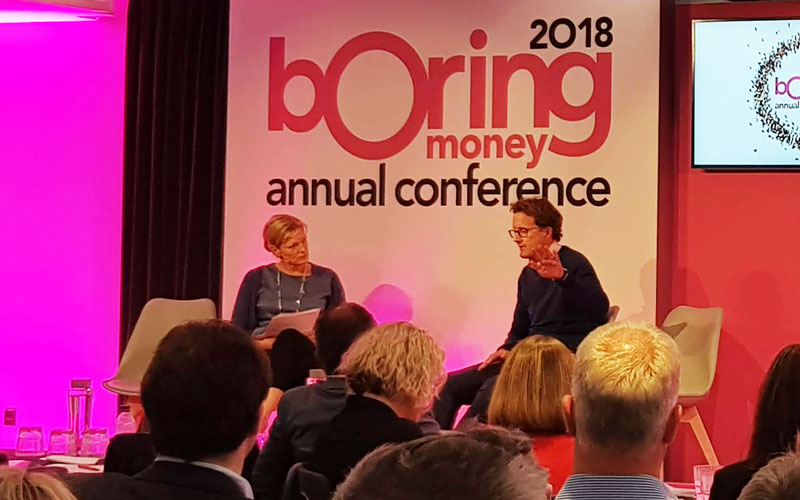The 2018 Boring Money Annual Conference brought together a number of prominent figures from across the investment industry, to debate the issues that are likely to dominate industry thinking in the months and years ahead, and particularly how the financial industry can do a better job of engaging with its customers. Here are four of the main talking points.
Learning 1: Changing consumer behaviour will drive the future of investing
Tom Savigar of The Future Lab gave the keynote presentation, offering an insight on some of the current trends that are shaping the way investing will be conducted in the future.
He reminded the audience that technological advancement, the rise of convenience and societal definitions continue to reconfigure way consumers digest information, buy things and make decisions. And that the financial services industry was not immune to these changes.
Some of the statistics were illuminating:
- In a survey in the US, Western Europe and Australia, shoppers said they would pay 11% more for each added layer of convenience in the food chain.
- By 2020, the average person will have more conversations with bots than with their spouse.
- 40.6% of people under 30 believe a sense of purpose is the most important criterion when considering a job.
- 22% of wealthy investors now consider environment, society and corporate governance issues before deciding where to invest, and 42% plan to do so.
The fundamental shift towards purpose
Today’s consumers, and in particular millennials approach things differently than previous generations. Economic decisions are now wrapped up in the meaning they impart and the transformation they offer consumers.
For example, 62% of millennials want to make a positive difference in the world. This is a generation less defined by wealth and less obsessed with the accumulation of wealth. They’ve grown up in a time of austerity. As a result, they believe that what you leave behind is important.
“So how do you reach this generation of consumers? You need to talk to them as humans, and help them to find their place in the world… If you deliver belonging, you will win.”
Tom Savigar, The Future Lab
This articulation of purpose dovetailed neatly with the ‘fireside chat’ discussion between Boring Money’s CEO Holly Mackay and Octopus Group chief executive Simon Rogerson. Simon talked about his views on why sections such as financial services and energy are fundamentally broken, and why ‘outbehaving’ and earning the trust of your customers is mission critical to businesses who want to stay relevant.
“In ten years, people will care as much about where their money is invested as the return it generates…at the moment financial companies don’t represent people’s world-changing motivations. I know my bank doesn’t represent me.”
Octopus Group CEO Simon Rogerson

Octopus CEO Simon Rogerson talks to Boring Money’s CEO Holly Mackay about rebuilding consumer trust.
Learning 2: For most people, the concept of risk is strongly associated with loss
A large proportion of the day was given over to discussing the concept of risk, and how it is applied and interpreted across the investment industry.
Risk means different things to different people. But most commonly in the concept of investing, consumers associate it with loss. And most focus on the risk of losing money as an absolute/binary outcome, rather than the chance or probability of loss.
Boring Money and News UK carried out a survey of readers of The Times and The Sunday Times in August 2018. They asked open-ended questions that looked at people’s perceptions of ‘risk’ in an investment context.
- Over three quarters (77%) of respondents, associated risk with losing money.
- Only 19% mentioned potential gains when asked about the meaning of risk in the concept of investing.
- Both men and women were as likely as each other to associate risk with loss, though women were less likely to associate risk with volatility and potential gains (16%) compared to men (22%).
Most people associate day-to-day risk with unfamiliarity – dealing with the unknown. But the risks that investors are most concerned about directly reflect the concept of absolute loss. The impact of interest rates and taxation on investments are potential complexities which are much less understood by investors, and have less prominence as a result.
In fact, it was argued that risk has such a strong association with loss, and also associations with total loss – that it feels like the wrong word to use with consumers. Are investment ups and downs better described as ‘uncertainty’, rather than risk?
Defining risk and uncertainty in these terms could be helpful to investors who are too easily discouraged by negative warnings about loss, and could help to put the uncertainty of investing into terms that are both more meaningful to consumers and put investing into perspective.
“To succeed… [investment companies] have to stop defining the customer proposition in terms of risk. You have to define your proposition in terms that are meaningful and appealing to your customers and relevant to your brand.”
Lucien Camp, Lucien Camp Consulting
Learning 3: Let’s help women rethink their relationship with money
One of the most unsettling discussion points raised by Holly Mackay during the day was the fact that fewer women invest in men. This is a worry, because not only do women on average have less disposable income, but they also on average live longer than men.
Therefore, failing to take the decisions that will help to grow their money puts women at a much greater risk of poverty as they get older.
“We need to dismantle the mystique of investing for women”
But as the panel discussion quickly highlighted, many women simply do not feel confident with investing. Lack of financial knowledge is a commonly-cited cause, and many women prefer to hold cash investments rather than riskier assets.
Boring Money’s survey revealed that just 12% of women owned stocks and shares ISAs, compared with 19% of men. It also suggested that 20% of women had no confidence when it comes to opening an investment account, compared to 13% of men.
Of course, at a time when the vast majority of cash ISAs are still paying a rate of interest below the current rate of inflation, this means they are losing money and missing out on the potential of higher returns by putting the money to better use elsewhere.
“Money is emotional. For women it is still a means to independence, freedom, security for our children, and other freighted states of being and mind that men can generally take for granted.”
Lucy Mangan, Guardian columnist
Learning 4: Time to rethink our approach to building trust?
One of the highlights of the day was the discussion around why so many consumers don’t seek out investment advice, or ask for professional help with their financial planning. Partly this was put down to people feeling vulnerable by the asymmetrical relationship between the ‘man or woman in the street’ and the financial experts or advisers.
Another key point was that financial advice is seen as an intangible at the point of purchase. You won’t be able to know or determine the full ‘value’ of the advice you’ve been given until much later.
But ultimately, it was demonstrated that the relationship required a significant amount of trust. Or in the words of Herman Brodie: “you’re all in the trust business”. Herman Brodie is a speaker and author on practical behavioural economics and a consultant for the investment management industry.
In his book, The Trust Mandate, Herman points out that when it comes to assessing trustworthiness, the two essential ingredients are benevolence and competence. Every profession can be plotted on a scale of benevolence and competence.
Trust is an emotional decision
Perceptions of benevolence and competence explain a person’s decision to trust. At one end of the scale, firefighters and doctors earn admiration and respect and are seen as both benevolent and competent. This makes them the two most ‘trusted’ professions. Nursery teachers score high on benevolence, but somewhere in the middle on competence.
Politicians and estate agents earn low scores for benevolence and at the lower end for competence. Entrepreneurs are seen as highly competent, but viewed less positively when it comes to benevolence.
And what about those from the financial services industry? Well, while the industry is perceived of as competent, it’s not viewed as benevolent. Winning the trust of consumers will come down to moving the needle firmly towards the direction of benevolence. In fact, customers value the advice and trust of financial planners over the performance of the investments themselves.
Getting it right all comes down to communication and interpersonal skills. Herman Brodie argued that the industry should stop trying to prove its competence, and to work harder on showing its benevolence.
“You’re all in the trust business… and getting the small things right brings you closer to benevolence. Every interaction is an opportunity to express benevolent intentions.”
Herman Brodie, consultant
About Boring Money
Boring Money is an independent business set up by investment industry veteran Holly Mackay, to help normal people who don’t have PhDs in finance make smart investment decisions quickly and painlessly.
For more information, please visit the Boring Money website.


